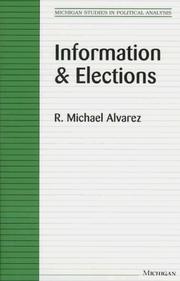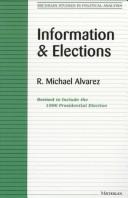| Listing 1 - 10 of 18 | << page >> |
Sort by
|

ISBN: 0472107798 Year: 1997 Publisher: Ann Arbor : University of Michigan Press,
Abstract | Keywords | Export | Availability | Bookmark
 Loading...
Loading...Choose an application
- Reference Manager
- EndNote
- RefWorks (Direct export to RefWorks)
Presidents --- Voting --- Electioneering --- Communication in politics --- Présidents --- Vote --- Propagande électorale --- Communication politique --- Election --- Political campaigns --- Election. --- Présidents --- Propagande électorale
Book
ISBN: 9781107107885 9781107518414 9781316257340 1107107881 1107518415 1316257347 1316530566 1316532240 Year: 2016 Publisher: Cambridge Cambridge University Press
Abstract | Keywords | Export | Availability | Bookmark
 Loading...
Loading...Choose an application
- Reference Manager
- EndNote
- RefWorks (Direct export to RefWorks)
Quantitative research in social science research is changing rapidly. Researchers have vast and complex arrays of data with which to work: we have incredible tools to sift through the data and recognize patterns in that data; there are now many sophisticated models that we can use to make sense of those patterns; and we have extremely powerful computational systems that help us accomplish these tasks quickly. This book focuses on some of the extraordinary work being conducted in computational social science - in academia, government, and the private sector - while highlighting current trends, challenges, and new directions. Thus, Computational Social Science showcases the innovative methodological tools being developed and applied by leading researchers in this new field. The book shows how academics and the private sector are using many of these tools to solve problems in social science and public policy.
Social sciences --- Data processing --- Mathematical models --- Methodology --- Methods in social research (general) --- Data processing. --- Mathematical models. --- Methodology.

ISBN: 1282604554 9786612604553 0472022377 9780472022373 0472085751 9780472085750 Year: 1997 Publisher: Ann Arbor : University of Michigan Press,
Abstract | Keywords | Export | Availability | Bookmark
 Loading...
Loading...Choose an application
- Reference Manager
- EndNote
- RefWorks (Direct export to RefWorks)
Presidents --- Voting --- Political campaigns --- Communication in politics --- Election.
Book
Year: 1998 Publisher: Ann Arbor University of Michigan Press
Abstract | Keywords | Export | Availability | Bookmark
 Loading...
Loading...Choose an application
- Reference Manager
- EndNote
- RefWorks (Direct export to RefWorks)
Book
ISBN: 1282531565 9786612531569 1400834678 9781400834679 9780691154350 069115435X 9780691143057 0691143056 9781282531567 Year: 2010 Publisher: Princeton, NJ
Abstract | Keywords | Export | Availability | Bookmark
 Loading...
Loading...Choose an application
- Reference Manager
- EndNote
- RefWorks (Direct export to RefWorks)
Making up 14.2 percent of the American population, Hispanics are now the largest minority group in the United States. Clearly, securing the Hispanic vote is more important to political parties than ever before. Yet, despite the current size of the Hispanic population, is there a clear Hispanic politics? Who are Hispanic voters? What are their political preferences and attitudes, and why? The first comprehensive study of Hispanic voters in the United States, New Faces, New Voices paints a complex portrait of this diverse and growing population. Examining race, politics, and comparative political behavior, Marisa Abrajano and R. Michael Alvarez counter the preconceived notion of Hispanic voters as one homogenous group. The authors discuss the concept of Hispanic political identity, taking into account the ethnic, generational, and linguistic distinctions within the Hispanic population. They compare Hispanic registration, turnout, and participation to those of non-Hispanics, consider the socioeconomic factors contributing to Hispanics' levels of political knowledge, determine what segment of the Hispanic population votes in federal elections, and explore the prospects for political relationships among Hispanics and non-Hispanics. Finally, the authors look at Hispanic opinions on social and economic issues, factoring in whether these attitudes are affected by generational status and ethnicity. A unique and nuanced perspective on the Hispanic electoral population, New Faces, New Voices is essential for understanding the political characteristics of the largest and fastest growing group of minority voters in the United States.
Voter registration --- Voting registers --- Voting research --- Hispanic Americans --- Elector registers --- Electoral rolls --- Poll books --- Poll lists --- Pollbooks --- Registers, Voting --- Voter lists --- Voter registers --- Voters lists --- Voters registers --- Voting --- Lists --- Voting behavior research --- Elections --- Cross-cultural studies. --- Politics and government. --- Research --- Latin Americans --- Latinxs --- Ethnology --- Politics and government
Book
ISBN: 1316056732 1316054365 1107264197 110704863X 1107625955 Year: 2014 Publisher: Cambridge : Cambridge University Press,
Abstract | Keywords | Export | Availability | Bookmark
 Loading...
Loading...Choose an application
- Reference Manager
- EndNote
- RefWorks (Direct export to RefWorks)
Some of the nation's leading experts look at various aspects of election administration, including issues of ballot format, changes in registration procedures, the growth in the availability of absentee ballot rules and other forms of 'convenience voting', and changes in the technology used to record our votes. They also look at how the Bush v. Gore decision has been used by courts that monitor the election process and at the consequences of changes in practice for levels of invalid ballots, magnitude of racial disparities in voting, voter turnout, and access to the ballot by those living outside the United States. The editors, in their introduction, also consider the normative question of exactly what we want a voting system to do. An epilogue by two leading election law specialists looks at how election administration and election contest issues played out in the 2012 presidential election.
Elections --- Election law --- Electoral politics --- Franchise --- Polls --- Political science --- Politics, Practical --- Plebiscite --- Political campaigns --- Representative government and representation --- Management. --- Bush, George W. --- Gore, Al, --- Gore, Albert --- Bush, George, --- Bush, Geo, --- Bush, Dzhordzh Uoker, --- Bush, Dzh. U. --- Bush, Dzh. --- Bush, --- Bushi, Qiaozhi W., --- Bush, Zhorzh, --- Arbusto, Jorge W., --- Bush, Xhorxh W., --- Gore, Albert, --- Trials, litigation, etc. --- Gore, Albert Arnold, --- Гор, Ал, --- Гор, Альберт,

ISBN: 069109635X Year: 2002 Publisher: Princeton (N.J.): Princeton university press
Abstract | Keywords | Export | Availability | Bookmark
 Loading...
Loading...Choose an application
- Reference Manager
- EndNote
- RefWorks (Direct export to RefWorks)
Political culture --- Political psychology --- Public opinion --- Values
Book
ISBN: 0691220190 Year: 2002 Publisher: Princeton : Princeton University Press,
Abstract | Keywords | Export | Availability | Bookmark
 Loading...
Loading...Choose an application
- Reference Manager
- EndNote
- RefWorks (Direct export to RefWorks)
Those who seek to accurately gauge public opinion must first ask themselves: Why are certain opinions highly volatile while others are relatively fixed? Why are some surveys affected by question wording or communicative medium (e.g., telephone) while others seem immune? In Hard Choices, Easy Answers, R. Michael Alvarez and John Brehm develop a new theory of response variability that, by reconciling the strengths and weaknesses of the standard approaches, will help pollsters and scholars alike better resolve such perennial problems. Working within the context of U.S. public opinion, they contend that the answers Americans give rest on a variegated structure of political predispositions--diverse but widely shared values, beliefs, expectations, and evaluations. Alvarez and Brehm argue that respondents deploy what they know about politics (often little) to think in terms of what they value and believe. Working with sophisticated statistical models, they offer a unique analysis of not just what a respondent is likely to choose, but also how variable those choices would be under differing circumstances. American public opinion can be characterized in one of three forms of variability, conclude the authors: ambivalence, equivocation, and uncertainty. Respondents are sometimes ambivalent, as in attitudes toward abortion or euthanasia. They are often equivocal, as in views about the scope of government. But most often, they are uncertain, sure of what they value, but unsure how to use those values in political choices.
Political psychology. --- Politična psihologija. --- Values. --- Vrednote. --- Political culture. --- Politična kultura. --- Public opinion. --- Javno mnenje. --- United States of America. --- Združene države Amerike. --- Affirmative action. --- Anti-Semitism. --- Attitude. --- Authoritarianism. --- Beliefs. --- Black. --- Brehm, John. --- Casualties. --- Catholic. --- Converse, Philip. --- Donnelly Marketing Service. --- Downs, Anthony. --- Ecological inference. --- Egalitarianism. --- Elite. --- Equivocation. --- Euthanasia. --- Feldman, Stanley. --- Foreign policy. --- Gay rights. --- General Social Survey (GSS). --- Heterogenity. --- Heteroskedastic choice. --- Humanitarianism. --- Ideology. --- Individualism: economic. --- Internal Revenue Service. --- Jackson, John E. --- Kinder, Donald R. --- Lazarfeld, Paul. --- Media. --- Michigan school. --- National Election Studies (NES). --- Operation Rescue. --- Piazza, Thomas. --- Predispositions. --- Racial policy.
Book
ISBN: 9781107625952 9781107264199 9781107048638 Year: 2014 Publisher: Cambridge Cambridge University Press
Abstract | Keywords | Export | Availability | Bookmark
 Loading...
Loading...Choose an application
- Reference Manager
- EndNote
- RefWorks (Direct export to RefWorks)
Book
ISBN: 9780691220192 Year: 2020 Publisher: Princeton, NJ
Abstract | Keywords | Export | Availability | Bookmark
 Loading...
Loading...Choose an application
- Reference Manager
- EndNote
- RefWorks (Direct export to RefWorks)
| Listing 1 - 10 of 18 | << page >> |
Sort by
|

 Search
Search Feedback
Feedback About UniCat
About UniCat  Help
Help News
News